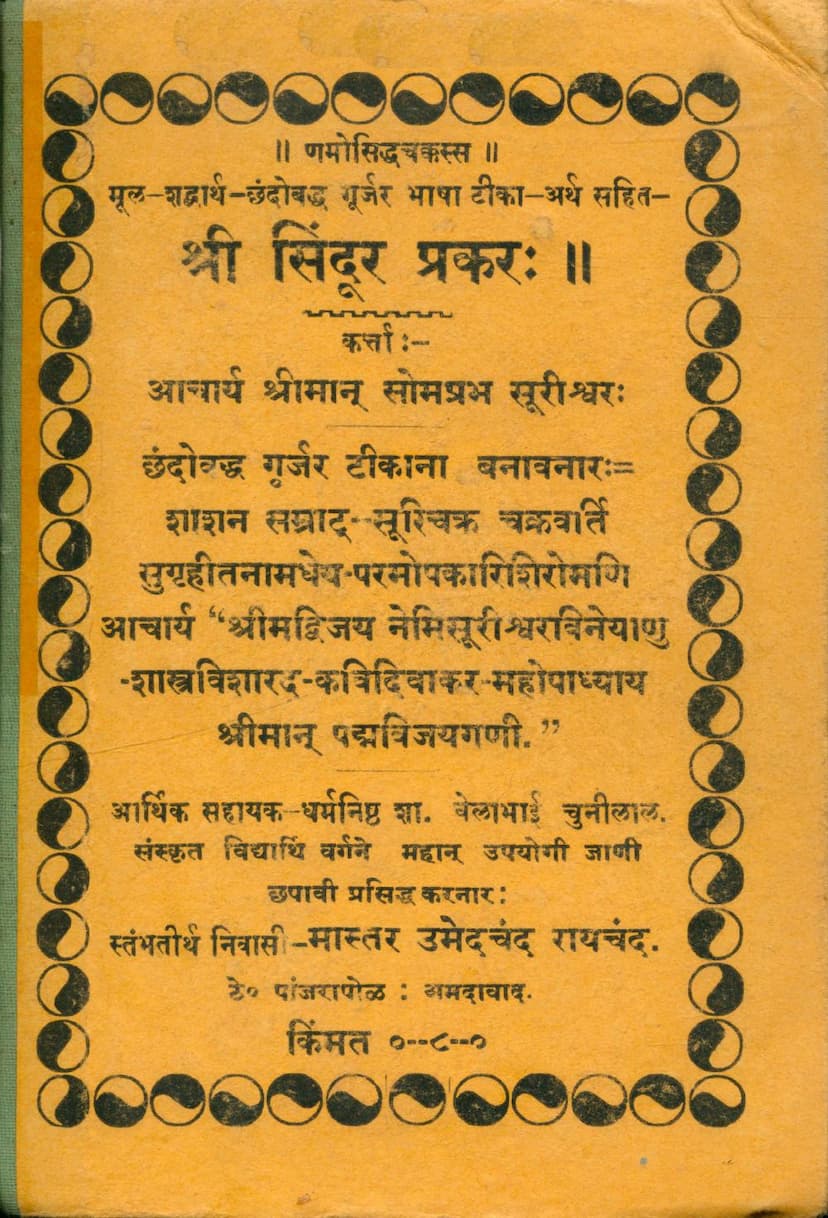Sindur Prakar
Added to library: September 2, 2025

Summary
Here's a comprehensive summary of the Jain text "Sindur Prakar" based on the provided pages:
Book Title: Sindur Prakar Author: Acharya Shri Somprabha Surishwar (original author), Acharya Shri Padmavijay Gani (author of the Gujarati commentary) Publisher: Master Umedchand Raichand, Panjrapole, Ahmedabad Catalog Link: https://jainqq.org/explore/022135/1
Overall Purpose and Content:
"Sindur Prakar" is a significant Jain text that delves into the principles and practices of Jainism. The book is presented with the original Sanskrit verses (shlokas) and a detailed commentary in Gujarati verse, making it accessible to a wider audience. The Gujarati commentary is attributed to the learned Acharya Shri Padmavijay Gani. The text aims to guide individuals towards spiritual liberation (moksha) by elaborating on the core tenets of Jain philosophy, including right faith (samyak darshan), right knowledge (samyak jnan), and right conduct (samyak charitra).
Key Themes and Sections:
The book is structured to provide a holistic understanding of the Jain path to salvation. While the provided pages offer extensive commentary and introductory material, the core of "Sindur Prakar" as described by the commentary focuses on:
- The Path to Moksha: The text emphasizes that true success in life, both in this world and the next, comes from adhering to the teachings of Lord Mahavir and the path of right faith, right knowledge, and right conduct.
- The Importance of the Four Anuyogas: The commentary explains the necessity of the four Anuyogas (Dravyanuyoga, Ganitanuyoga, Charnanuyoga, and Mayanuyoga) in Jain scripture. Each Anuyoga serves a distinct purpose in understanding spiritual truths and guiding different types of individuals towards liberation.
- The Nature of Karma and Its Effects: The text touches upon the concept of karma, explaining how impure mental states (adhyavasa) lead to the manifestation of karma and consequently, diseases (dravya-roga and bhava-roga). It highlights the role of attachment (raga) in the increase of external ailments.
- The Teachings of Jain Acharyas: The commentary frequently refers to the wisdom of past Jain scholars and saints, such as Shri Haribhadra Surishwarji, who compiled the essence of Jain teachings into various texts for the benefit of all beings.
- The Significance of "Sindur Prakar": The book itself is named "Sindur Prakar" because the word "Sindur" appears at the beginning of the mangalacharan shloka. The text is described as an insightful and poetic work that uses practical analogies to convey profound spiritual messages.
- Discourse on Twenty Topics: The book expounds on twenty specific topics to elucidate the path of liberation, which are mentioned by the author in the eighth shloka. The Gujarati commentary makes these topics accessible through its rhythmic and meaningful verses.
- Biographical Information: While detailed biographical information about the original author, Acharya Shri Somprabha Surishwar, is scarce, it is mentioned that he was a disciple of Shri Vijay Simha Surishwarji, who in turn was a disciple of Shri Atideva Surishwarji. The text suggests the original work might have been composed in the 13th century.
- The Gujarati Commentary's Value: Acharya Shri Padmavijay Gani's contribution is highly valued for making the profound and sometimes intricate Sanskrit verses easily understandable through his commentary in simple, rhythmic Gujarati. The commentary also offers spiritual insights and elucidations at opportune moments.
- The Role of the Publisher: Master Umedchand Raichand is credited with undertaking the noble task of publishing this important work, recognizing its immense value for the student community and the general public. The publication of this second edition, following the success of the first, is a testament to its utility and demand.
- Encouragement for Spiritual Pursuit: The text consistently encourages readers to engage in righteous activities, practice virtue, renounce worldly attachments, and cultivate spiritual knowledge and conduct to attain the ultimate goal of liberation.
- Praise for the Text: The "Sindur Prakar" is lauded for its excellent composition, insightful teachings, and the author's profound understanding of spiritual concepts. It is seen as a valuable resource for spiritual upliftment and the pursuit of Jain dharma.
- Emphasis on Virtues: The text highlights the importance of various virtues such as devotion to the Tirthankaras, Guru, and the Jain community; non-violence; truthfulness; non-stealing; chastity; non-possession; control over anger, pride, deceit, and greed; kindness; association with the virtuous; control of the senses; charity; austerity; and detachment.
- The Nature of Divine Grace and Human Effort: The commentary suggests that while divine grace and the teachings of the Tirthankaras are crucial, human effort, guided by proper understanding and conduct, is essential for spiritual progress.
- The Importance of Dharma: The text underscores that life without Dharma is futile, like that of an animal. Dharma is presented as the means to achieve both worldly prosperity (artha) and spiritual liberation (moksha).
- The Difficulty of Human Birth and the Need for Diligence: The text emphasizes the rarity and preciousness of human birth, calling it a great opportunity to practice Dharma. It warns against wasting this chance due to laziness or ignorance, comparing it to losing a divine gem.
- The Power of Good Deeds: The book illustrates the immense benefits of righteous actions, such as worship, charity, and adherence to ethical principles, leading to prosperity, good health, reputation, heavenly rebirths, and ultimately, liberation.
- The Dangers of Wrong Conduct: Conversely, the text also details the negative consequences of unrighteous actions, such as attachment, anger, greed, hypocrisy, and the neglect of spiritual duties, leading to suffering and rebirth in lower realms.
In essence, "Sindur Prakar" serves as a comprehensive guide for Jain followers, offering profound philosophical insights and practical advice for spiritual advancement, all presented in an accessible and engaging Gujarati verse commentary.